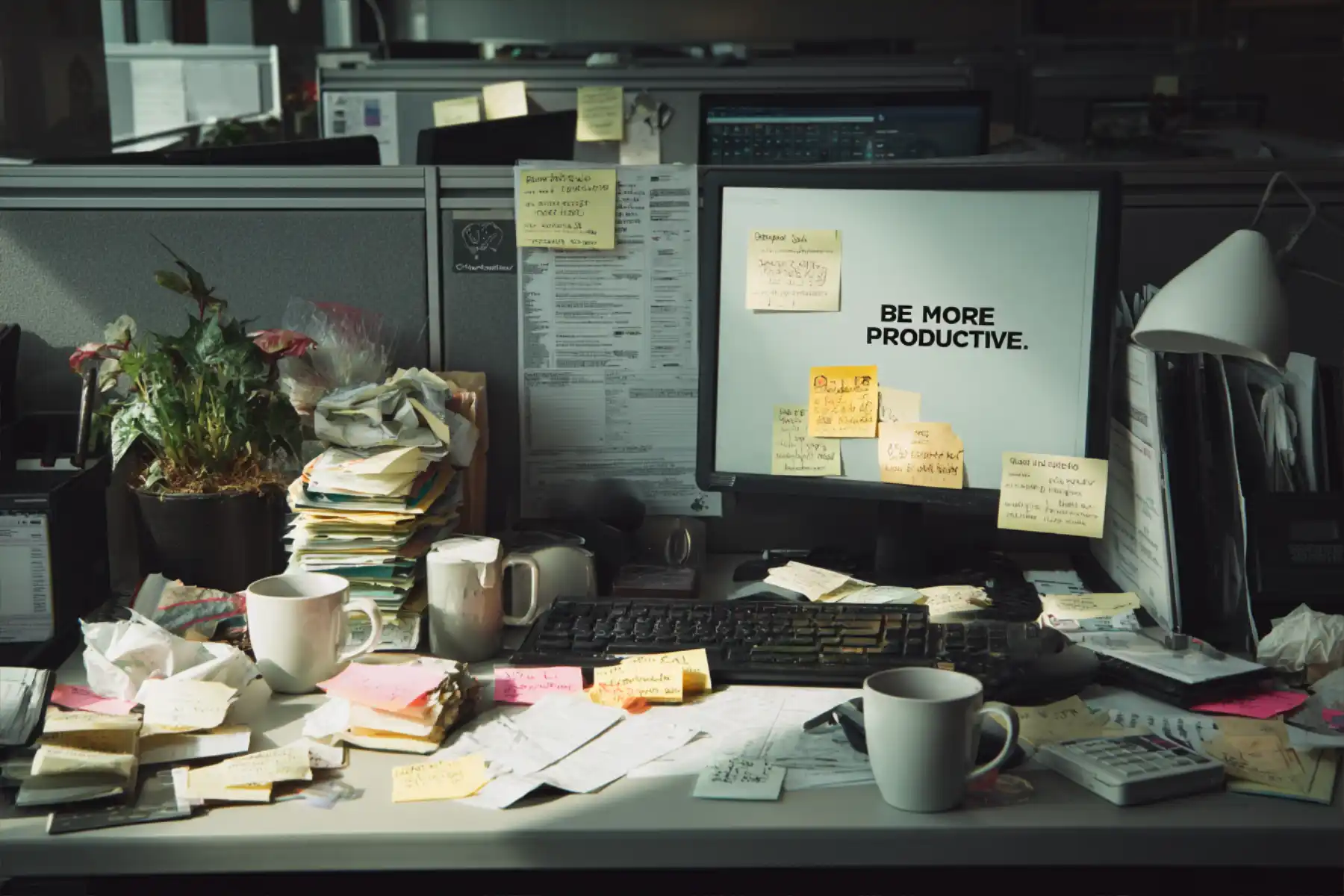
The Time Poverty Industrial Complex: How They Profit From Your Exhaustion (And Why You Let Them)
You know that meditation app on your phone? The one you pay $12.99 a month for but never use? Calm is worth $2 billion because you're too burned out to breathe without a subscription [5].
That meal kit rotting in your fridge? HelloFresh hit $8 billion in revenue selling pre-chopped vegetables to people who've forgotten what a kitchen knife looks like [3]. DoorDash? $72 billion. Because after your 11-hour day, even boiling water feels like asking too much.
Welcome to the Time Poverty Industrial Complex—where your exhaustion isn't a bug, it's a feature. Where every hour you don't have is someone else's revenue stream.
The con is beautiful in its simplicity: They steal your time. Then they sell it back to you.
And the real kicker? You thank them for it.
The Markup on Your Misery
Let's start with the most elegant scam in corporate America: the billable hour.
Your consulting firm pays you $40 an hour. They bill you out at $250. That's a 625% markup on your existence [1]. You're not an employee—you're an arbitrage opportunity with a pulse.
"Pretty standard," says the industry veteran about these ratios. Three-and-a-half to five times salary for junior staff. The consulting guide puts it bluntly: "If revenue is produced with a positive margin, then more billable hours equates directly to higher profit." The only challenge? "Convincing your employees to work more" [1].
Convincing. As if that managing director's "disappointed" face when you leave at 7 PM isn't a profit optimization strategy.
Every extra hour you stay late—every weekend you "volunteer," every vacation day you don't take—pure profit. You're salaried, so overtime costs them nothing. But they bill it all the same.
The Burnout-to-SaaS Pipeline
Notion is worth $10 billion [2]. For digital Post-it notes. Because when you're drowning in tasks, you don't need fewer tasks. You need a prettier way to list them.
Calendly hit $3 billion by solving a problem that shouldn't exist: the back-and-forth of scheduling [2]. Its entire value proposition is that professional adults are too overwhelmed to type "How's Tuesday at 3?"
Every Y Combinator batch has startups solving problems that shouldn't exist. Time-tracking for people with no time. Wellness platforms for people made unwell by work.
They're not solving burnout. They're scaling it.
Silicon Valley's greatest innovation isn't AI or crypto. It's monetizing the gap between how humans should live and how capitalism forces us to live. Every inefficiency in your overwhelmed life is someone's seed round.
No one's pitching "What if people just worked less?" to Sequoia Capital.

The Wellness Shakedown
The corporate wellness industry generates $65 billion annually [4]. Not preventing burnout—monetizing it.
Calm went from 90% free content to 5% free. Once you're hooked on guided breathing to survive your job, they've got you. Nearly $600 million in yearly revenue from people too stressed to sleep [5].
BetterHelp spent $100 million on advertising in 2023. A clinical psychologist called their model "essentially fraudulent"—marketing therapy while operating like Uber for mental health [6].
Your employer subsidizes these apps. Not because they care, but because a meditation app is cheaper than adequate staffing. The problem isn't the 70-hour weeks, it's your lack of mindfulness, right?
You're not just overworked. You're over-monetized.
The Great Time Heist
While you're subscribing to seventeen apps to manage your chaos, someone's figured out the time equation. They're just not sharing.
Sam Corcos, a startup CEO, delegates 400 tasks a month. His company provides twelve outsourced executive assistants to all employees. Because he understands: every minute a high-value employee spends on bullshit is profit lost [7].
Ninety-three percent of CEOs have dedicated executive assistants [7]. The C-suite doesn't use Calendly; they have humans for that.
Meanwhile, you're spending Sunday nights doing expense reports.
This is executive time laundering: those at the top convert money into time, those at the bottom convert time into money. Your CEO leaves at 5 PM for their kid's recital while you're grinding until midnight on the presentation they'll glance at tomorrow.

Why You're Complicit
Now for the uncomfortable part. The reason this whole system works.
You're addicted.
Columbia Business School found that busyness has become a status symbol in America. Being slammed is the new Rolex. "I'm so busy" isn't a complaint—it's a brag [9].
Forty-six percent of Americans don't use all their paid time off. Half say they "don't feel they need to." As if rest were optional. Forty-three percent worry about falling behind, looking less dedicated [8].
This is learned helplessness dressed up as ambition.
High achievers use overwork like a drug. It numbs existential questions, provides validation hits, offers the illusion of control. We work ourselves sick because stopping would mean confronting who we are without the armor of busy-ness [10].
Some people unconsciously prefer exhaustion to examination. Every packed calendar is a wall against uncomfortable truths.
The Price Tag on Your Life
Let's do the math they hope you never do.
Working 60 hours instead of 40? That's 1,040 extra hours yearly. Twenty-six extra work weeks. Half a year. For free [12].
Do this from 30 to 65, and you've worked 17.5 extra years. Nearly two decades of your life, donated to shareholder value [12].
What could you build in 17.5 years? What could you love? What could you become?
The time poverty industrial complex doesn't want you doing this math. It wants you believing that the solution to having no time is better time management, not working less.
You're cadre. Framed. And the frame is shrinking.
The Reckoning
The game is rigged, but not inevitable. The Great Resignation was just the preview. The real show is the Great Realization: your time is the only wealth that matters, and you've been giving it away for pennies on the dollar.
Maybe we'll stop wearing exhaustion like a medal. Stop believing that the solution to systemic exploitation is individual optimization.
Maybe we'll realize that the time poverty industrial complex can only sell what we're willing to buy.
The most radical thing you can do in a culture of overwork isn't to work harder or smarter or more efficiently.
It's to work less. And not apologize for it.
But first, delete that meditation app. You don't need guided breathing. You need your life back.
They've sold you your own life one hour at a time.
Buy it back. Then burn the receipt.
Your move.
References
- The unfortunate math behind consulting companies - A Smart Bear (2010)
- Notion Statistics 2025: Revenue, Valuation, Users - Taptwice Digital (2025)
- U.S. Meal Kit Delivery Market Report - Grand View Research (2023)
- Burnout/Wellness – Burnout as profit model - RegenerativeLaw (2024)
- Calm Revenue and Usage Statistics 2024 - Business of Apps (2024)
- The Problem with BetterHelp - Psychology Today (2023)
- How CEOs Manage Time - Harvard Business Review (2018)
- More than 4 in 10 U.S. workers don't take all their paid time off - Pew Research Center (2023)
- How Busyness Became the New Status Symbol - TIME Magazine (2024)
- Psychology of Overworking: Why We Do It - LinkedIn (2025)
- Using money to buy time linked to increased happiness - ScienceDaily (2017)
- Working Hours Calculation: Standard calculation based on 52 weeks/year, 40-hour baseline vs 60-hour actual.
Related Posts

The Money Equation: Time, Happiness & Intentional Spending
Discover how to rethink your relationship with money by valuing time and happiness over mindless consumption. Learn the framework for intentional spending and sustainable earning.

Financial Freedom Isn't About Quitting—It's About Control
Discover why financial independence is the only real freedom left in a system designed to keep you dependent. Learn how to reclaim control of your life through smart financial strategies.
We’re a group of passionate finance enthusiasts dedicated to making money management simple, actionable, and accessible for everyone.
Enjoyed this post?
Subscribe for more insights, tips, and updates—straight to your inbox.
We respect your privacy and will never share your information.